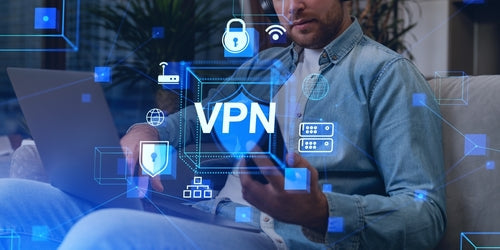
Keep Data Safe This Holiday: VPN Checklist for Lawyers
The holiday season is a time for relaxation, travel, and connecting with loved ones. However, it can also present heightened cybersecurity risks for lawyers and legal professionals. Picture this: you’re checking your email at a coffee shop or airport lounge. Do you know if your sensitive client data is secure? With cybercriminals ramping up their efforts during the festive period, the need for a Virtual Private Network (VPN) becomes critical. Lawyers entrusted with confidential information cannot afford to overlook this simple yet powerful tool for data protection.
The Holiday Threat Landscape
The holiday period is synonymous with increased cybercrime. Statistics show that phishing attempts, data breaches, and hacking incidents spike during this time. Why? Cybercriminals exploit the fact that people are often distracted, working remotely and using public Wi-Fi networks. These vulnerabilities are magnified for lawyers, who may be working from airports, hotels, or family homes.
Moreover, remote work and travel increase exposure to unsecured networks. A lawyer handling client files on public Wi-Fi is a prime target for hackers. Add the human factor—distractions and a reduced focus on security—and it’s clear why this period is a goldmine for cybercriminals. Lawyers risk breaching client confidentiality and violating legal and ethical obligations without adequate safeguards.
What is a VPN, and How Does it Work?
A Virtual Private Network (VPN) is a tool that creates a secure and encrypted connection between your device and the internet. By masking your IP address and encrypting your data, a VPN ensures that your online activities are shielded from prying eyes. This is particularly crucial when using public Wi-Fi networks, which are often unsecured and easily exploited by hackers.
For legal professionals, a VPN acts as a digital shield, safeguarding client communications, protecting sensitive files, and ensuring that online activities remain private. A VPN is essential whether you’re accessing cloud-based legal management systems, sending client documents, or simply checking emails.
Why VPNs Are Essential for Lawyers
The legal profession demands strict adherence to confidentiality and data protection. Here are some key reasons why lawyers and CIOs of law firms should prioritise VPN usage:
- Client Confidentiality: Lawyers must protect client information. A VPN ensures that unauthorised parties do not intercept or access sensitive data.
- Data Protection: Cyberattacks can lead to data breaches, reputational damage, and significant financial losses. A VPN mitigates these risks by encrypting data.
- Secure Communication: Emails and file transfers are vulnerable to interception. A VPN provides a secure channel, ensuring communications remain private.
- Regulatory Compliance: Data protection regulations impose stringent requirements on handling personal data. VPNs help meet these compliance standards.
Specific Risks During the Holiday Season
The holiday period amplifies cybersecurity risks. Here are some common threats:
- Public Wi-Fi Hotspots: Often unencrypted, these networks make it easy for hackers to intercept sensitive data.
- Phishing Attacks: Holiday-themed scams are designed to steal credentials or deploy malware.
- Device Theft: Increased travel heightens the risk of losing laptops, tablets, or smartphones, which may contain sensitive information.
How to Choose the Right VPN
Not all VPNs are created equal. When selecting a VPN for legal work, consider the following features:
- Military-Grade Encryption: Ensures that data remains secure and unreadable to third parties.
- No-Log Policies: The VPN provider should not store information about your online activities.
- Multi-Device Support: Lawyers often work across multiple devices, so the VPN should be compatible with all of them.
- Reliable Speed and Performance: A slow VPN can disrupt workflows. Choose one that offers fast and stable connections.
Additional Cybersecurity Tips for the Holidays
While a VPN is a powerful tool, it’s only one piece of the cybersecurity puzzle. Here are additional steps lawyers and law firms can take to stay secure during the holidays:
- Update Software: Ensure all devices and software are running the latest updates to protect against known vulnerabilities.
- Use Strong Passwords: Employ unique, complex passwords for all accounts and use a password manager to keep them secure.
- Enable Multi-Factor Authentication (MFA): Add an extra layer of security to your accounts.
- Be Wary of Suspicious Emails: Phishing emails are common during holidays. Verify the sender before clicking on links or downloading attachments.
Secure Your Work
The holiday season should be a time of joy, not a time to worry about cyber threats. For lawyers, protecting client confidentiality and ensuring secure communication is non-negotiable. By using a VPN, legal professionals can work securely from anywhere, comply with data protection regulations, and maintain the trust of their clients. Don’t wait until it’s too late; set up a VPN today and make it an integral part of your cybersecurity strategy.
Let’s prioritise peace of mind this holiday by staying vigilant and prepared. Share this article with colleagues and clients to spread awareness and promote a secure working environment.






